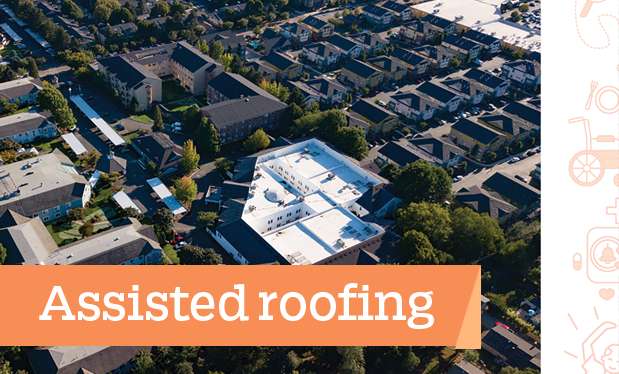Sustainability has become a trending topic within the roofing industry. Considering 40 million tons of roofing waste are sent to landfills each year, according to the Environmental Protection Agency (EPA), it may seem overwhelming to undertake sustainable initiatives to counter the industry's ill effects.
But in reality, small sustainable steps taken by roofing professionals are producing positive results. Distributors are finding ways to consolidate freight to reduce the number of trucks needed to transport products and introducing hybrid vehicles into their fleets. Roofing contractors are developing new sales materials to help customers learn about sustainable features of various roof systems and recycling torn-off roofing materials.
And as the creators of roofing products delivered by distributors and installed by contractors, manufacturers also have opportunities to practice sustainability. Following is a look at the sustainable practices some roofing industry manufacturers have adopted to reduce the roofing industry's environmental impact.
Reusing old materials
One of the most common sustainable practices roofing industry manufacturers implement is reusing old materials during the creation of new products.
Canton, Mass.-based Sika® Sarnafil® manufactures new products using recycled PVC from torn-off vinyl roof systems. The company uses special equipment to process the post-consumer PVC material into a form that can be reintroduced into new roof membranes and accessories.
Currently, more than 65 million tons of recycled PVC material have been processed for use in new products. Sika Sarnafil's 5- and 10-foot-wide Sarnafil and Sikaplan® single-ply roof membranes, PVC protection layer products and walkway pads contain a collective average of 10 percent recycled PVC. These low-slope products have received recycled content certification from UL's environment division.
Torn-off PVC roof systems also are integrated into new products at Duro-Last® Inc., Saginaw, Mich. At each of its six manufacturing plants, Duro-Last offers a Recycle Your Roof program that allows mechanically attached PVC roof systems to be returned to a facility for recycling at the end of their service lives.
"After a roof is done being a roof, we want to be able to take it back and make it into something new and useful," says Katie Chapman, sustainability specialist for Duro-Last.
The old roof systems are processed and manufactured into resilient flooring, walkway pads and concrete expansion joints. Duro-Last and its sister company, Oscoda Plastics® Inc., Oscoda, Mich., have recycled more than 80 million pounds of PVC material through the company's recycling efforts since 1993.
Glass recycling takes center stage at Owens Corning, Toledo, Ohio, where 1.4 billion pounds of pre- and post-consumer recycled glass content were used in fiberglass insulation products during 2017. The company's fiberglass insulation products are certified by SCS Global Services to contain between 53 and 73 percent recycled content. However, coming up with such a large amount of recycled glass for reuse in new products can be difficult, according to Gale Tedhams, director of sustainability for Owens Corning.
"Owens Corning is challenged to get enough recycled glass for our insulation products," she explains. "Much of the glass that consumers use never gets recycled and instead goes to the landfill."
To increase the supply of recycled glass, in 2009, Owens Corning helped establish a waste glass processing plant for supplier Ripple Glass in Kansas City, Mo. Eighty-five percent of post-consumer glass brought to the facility is used to make insulation after processing, and more than 1 billion glass bottles have been recycled at the facility.
In addition, Owens Corning has partnered with the Glass Recycling Coalition to promote consumer glass recycling in Baltimore, Florida, New York City, North Carolina, South Carolina, Tennessee and Washington, D.C.
Malarkey Roofing Products, Portland, Ore., and Tremco Inc., Beachwood, Ohio, also integrate recycled content into new products. In 2016, Malarkey Roofing Products began adding polymers from plastic milk jugs, markers and rubber tires to its Flexor™ asphalt to create Nexgen™ polymer-modified asphalt. Nexgen is used to create products in Malarkey Roofing Products' Vista™ architectural shingle line. And Tremco manufactures its TREMDrain® DPI insulation boards using 70 percent post-industrial recycled content.
Shingle recycling outreach
Although most roofing manufacturers' work involves creating new products for use at the beginning of a roof system's life cycle, manufacturers can influence sustainable efforts that occur at the end of a roof system's life by encouraging roofing contractors to recycle torn-off asphalt shingles.
The EPA estimates 11 million tons of asphalt shingle waste are generated in the U.S. each year. About 10 million tons comes from roof system installations and tear-offs, and the remaining 1 million tons are scraps from asphalt shingle manufacturers. Every ton of shingles that is recycled instead of sent to landfills is equivalent to saving one barrel of oil from use, according to the Northeast Recycling Council. Clearly, diverting asphalt shingles away from landfills can have a significant and positive environmental impact.
In 2010, Parsippany, N.J.-based roofing manufacturer GAF launched its Certified Green Roofer™ Program to recognize steep-slope roofing contractors who are environmental leaders. The program was developed in partnership with the U.S. Green Building Council and the Construction Materials Recycling Association (CMRA). Since the program's launch, hundreds of roofing contractors have become GAF Certified Green Roofers.
GAF Certified Green Roofers are required to commit to recycling asphalt shingles if a viable recycling option is available in their regions and submit an asphalt shingle recycling report quarterly. A GAF Certified Green Roofer who does not yet have an asphalt shingle recycling option available in his or her region must pledge to conduct his or her business in an environmentally friendly manner and begin recycling asphalt shingles when a facility opens in his or her region. In exchange for the recycling commitment, GAF Certified Green Roofers receive membership cards and certificates and can market themselves as sustainable contractors to potential customers.
In 2012, Martin Grohman, GAF's director of sustainability at the time, said the company's factory-certified contractors wanted a rigorous program where they could learn all aspects of sustainability and apply them to their businesses.
"They also wanted to have a meaningful designation they could use to demonstrate their commitment to sustainability," Grohman said. "The rapid growth of the program shows the commitment professional roofing contractors have to running their businesses in a sustainable way."
GAF also sponsors CMRA's asphalt shingle recycling web portal, www.shinglerecycling.org. Roofing contractors can access information about sustainable materials management, environmental regulations, research projects and industry events. A map of asphalt shingle recycling facilities also is available to help contractors connect with their local facilities.
With a similar objective in mind, in 2011, Owens Corning formed a strategic alliance with pro-recycling platform Earth911® to connect roofing contractors with convenient asphalt shingle recycling facilities. Owens Corning Roofing Preferred Contractors who take the Preferred Contractor Shingle Recycling Pledge can access the Earth911 Recycling Directory, educational videos and information about sustainable building practices, as well as receive promotional marketing materials from Owens Corning to help communicate their sustainable efforts to homeowners.
"As part of the program, we ask contractors to help the environment and promote sustainable business practices by pledging to recycle their shingle tear-offs," Tedhams says.
Currently, 74 percent of Owens Corning Roofing Preferred Contractors have taken the pledge. During 2017, 2.1 billion pounds of end-of-life shingles were recycled through the program.
Most recycled asphalt shingles are ultimately reused in road construction or maintenance. State-level Department of Transportation (DOT) offices have the authority to specify whether recycled asphalt shingles can be used in state-funded road projects, and many DOT offices have granted permission. Use of recycled asphalt shingles in road construction is said to increase asphalt stiffness and decrease cracking and rutting, resulting in longer-lasting roads.
According to the National Asphalt Pavement Association, nearly 950,000 tons of recycled asphalt shingles were used in asphalt pavement mixtures during 2017, which was a 32.1 percent decrease from the previous year. The decrease highlights the need for more asphalt shingle recycling facilities.
"It is much more difficult to find a company to recycle materials when you are located in a small rural area," says Chapman.
For now, roofing contractors who are interested in recycling torn-off shingles can search for local asphalt shingle recycling facilities online at www.shinglerecycling.org. Searches can be conducted by state, and contractors can access facility addresses and websites, fee information and information regarding the types of materials permitted.
In-house sustainable efforts
In addition to reusing old materials in new products and promoting asphalt shingle recycling, some roofing manufacturers have invested in sustainable initiatives in their facility operations.
Renewable energy
An array of photovoltaic (PV) panels helps power Sika Sarnafil's main distribution center in Canton. Installed in 2010 and expanded in 2017, the PV panels generate more than 70 percent of the electricity the building requires to operate. In addition, a land-mounted solar farm in nearby Walpole, Mass., supplies more than 24 percent of the electricity for Sika Sarnafil's manufacturing facility in Canton where roofing and waterproofing membranes and walkway products are made.
"We are strong proponents of rooftop solar," says Stanley Graveline, senior vice president of technical services for Sika Sarnafil. "We have used our own facility to benchmark different PV technologies and showcase our unique roof-integrated PV solution. As we strive to further reduce our carbon footprint, expanding our sourcing of renewable energy to a dedicated ground-based array was a logical extension of our program."
Owens Corning also has invested in renewable energy initiatives. A 1-megawatt solar project was completed at the company's manufacturing plant in Fairburn, Ga., in 2017. Owens Corning partnered with natural gas provider Constellation and Georgia Power to build a solar power system with nearly 3,000 PV panels on-site. The project is expected to reduce carbon dioxide emissions by an estimated 1,054 metric tons during its first year of operation.
Wind also is harnessed to power Owens Corning manufacturing facilities. Fifty-four percent of the energy consumed at the company's U.S. facilities comes from wind. Some of the renewable energy is sourced from the grid, and some is sourced from power purchase agreements that give Owens Corning renewable energy credits.
Waste diversion
Diverting waste from landfills is a key sustainable initiative at Duro-Last facilities. According to Chapman, comprehensive recycling programs have been implemented at each location, including the addition of recycling stations that can accept 15 material types. The company also has eliminated STYROFOAM™ cups and installed water bottle refilling stations to encourage employees to use refillable mugs and tumblers.
"During the past few years, we have managed to divert 95 percent of our facilities' waste from the landfill," Chapman says. "That means 95 percent of waste is recycled, reused or refurbished."
GAF and Malarkey Roofing Products each have received Waste Diversion from Landfill certifications from GreenCircle Certified® LLC, a third-party certifier of sustainability claims for products and operations, for their manufacturing facilities.
In April 2015, GAF announced its Tuscaloosa, Ala., asphalt shingle plant had received certification for diverting 94 percent of the waste generated at the facility. GAF's Myerstown, Pa., asphalt shingle plant also has received certification. In October 2016, Malarkey Roofing Products announced all three of its asphalt roofing facilities had received Waste Diversion from Landfill certifications. The company's Portland, Ore., facility achieved a 94 percent diversion rate; its South Gate, Calif., facility achieved a 93 percent diversion rate; and its Oklahoma City facility achieved an 89 percent diversion rate.
The desired effect
Roofing manufacturers throughout the U.S. have adopted a myriad of sustainable measures, including integrating old materials into new products, encouraging roofing contractors to recycle asphalt shingles, drawing power from renewable sources and finding ways to divert waste from landfills.
The time, money and effort manufacturers are devoting to sustainable initiatives shows there are industry professionals who care about reducing the industry's environmental impact. If even more professionals decide to take similar steps, the resulting positive effect will be unmistakable.



